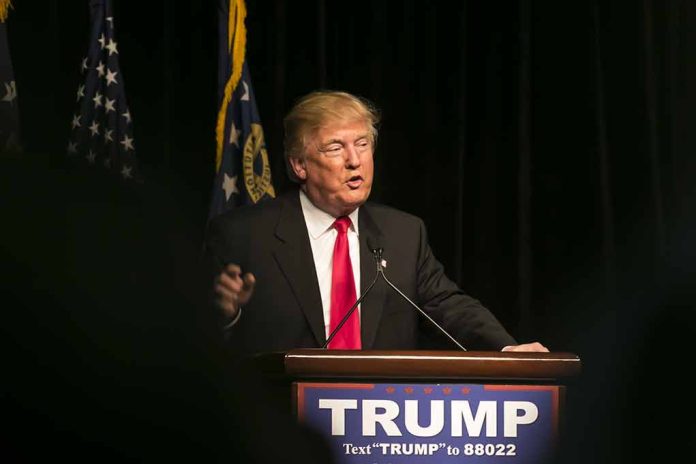
The US administration under President Trump remains firm in its stance on tariffs against China, affecting global markets and stirring international economic dynamics.
Key Takeaways
- President Donald Trump emphasizes that no country, including China, is exempt from trade tariffs.
- Smartphones and laptops face a 20% duty, with new plans for semiconductor tariffs.
- US-China trade tensions escalate with reciprocal tariffs exceeding 100%.
- Beijing views tariff exemptions as positive but urges complete tariff cancellation.
- Global stock markets experienced volatility following Trump’s tariff announcements.
US Tariffs: Unyielding Stance on China
Tensions between the United States and China remain high as President Donald Trump reiterates that no country will be exempt from trade tariffs. Despite a temporary reprieve on certain high-tech products, including smartphones and laptops, these items continue to face a 20% duty. Plans for new tariffs on semiconductors are anticipated, signaling a tougher stance on China’s tech industry.
China responded by welcoming the exemptions as a positive step but strongly urged the United States to cancel tariffs entirely. These tariff tensions have escalated to a point where the US imposes a 145% duty on Chinese goods, while China retaliates with a 125% duty on US imports, intensifying the trade war.
Global Market Repercussions
The trade tensions between the US and China have left a significant mark on global markets, causing volatility since Trump’s April 2 tariff announcement. Although a temporary 90-day pause provided some relief, recent tariff announcements created uncertainty and chaos for businesses and financial markets worldwide. As these tensions persist, concerns grow over potential consumer price increases and market instability.
The White House remains optimistic about potential trade agreements with China, despite the prevailing tensions. However, with no plans for direct talks, any progress remains uncertain. US stock futures have shown slight gains following the latest announcements, hinting at cautious optimism among investors.
💥CHINA JUST GOT BOXED OUT💥 by President Donald Trump has announced that he is raising tariffs on Chinese imports to 125%, effective immediately, citing China's "lack of respect" toward global markets. At the same time, he has authorized a 90-day pause on tariffs for most other… pic.twitter.com/13M1HynltD
— Jungleball2 (@JungleBall_2) April 9, 2025
Looking Ahead: Economic Diplomacy
Amidst the tensions, China has shifted focus to alternative economic collaborations, positioning itself as a stable alternative to the US. President Xi Jinping’s visits to Southeast Asia for talks underscore this strategic pivot. Meanwhile, President Trump indicates forthcoming investigations targeting the semiconductor and broader electronics supply chain, part of a comprehensive plan addressing national security concerns.
🔥President Trumps post: Nobody is getting off the hook with Tariffs, especially not China which by far, treats us the worst! 👊🇺🇸 pic.twitter.com/k2FxzJnkxV
— Patriotic 🇺🇸Suzanne⭐️⭐️⭐️ (@suzost) April 13, 2025
As the economic showdown continues, the Trump administration aims to negotiate beneficial trade deals, yet skepticism persists amid mounting criticism over the effects on US economic stability, bonds, the dollar, and consumer confidence. These developments reinforce the significant role that tariffs play in shaping international trade and economic alliances today.
Sources:
- Trump warns China ‘not getting off the hook’ on US tariffs for electronics | Trade War News | Al Jazeera
- Trump tariffs live: El Salvador’s Bukele visits; White House backs policies
- Trump says China, others not getting ‘off the hook’ on US tariffs – Insider Paper



